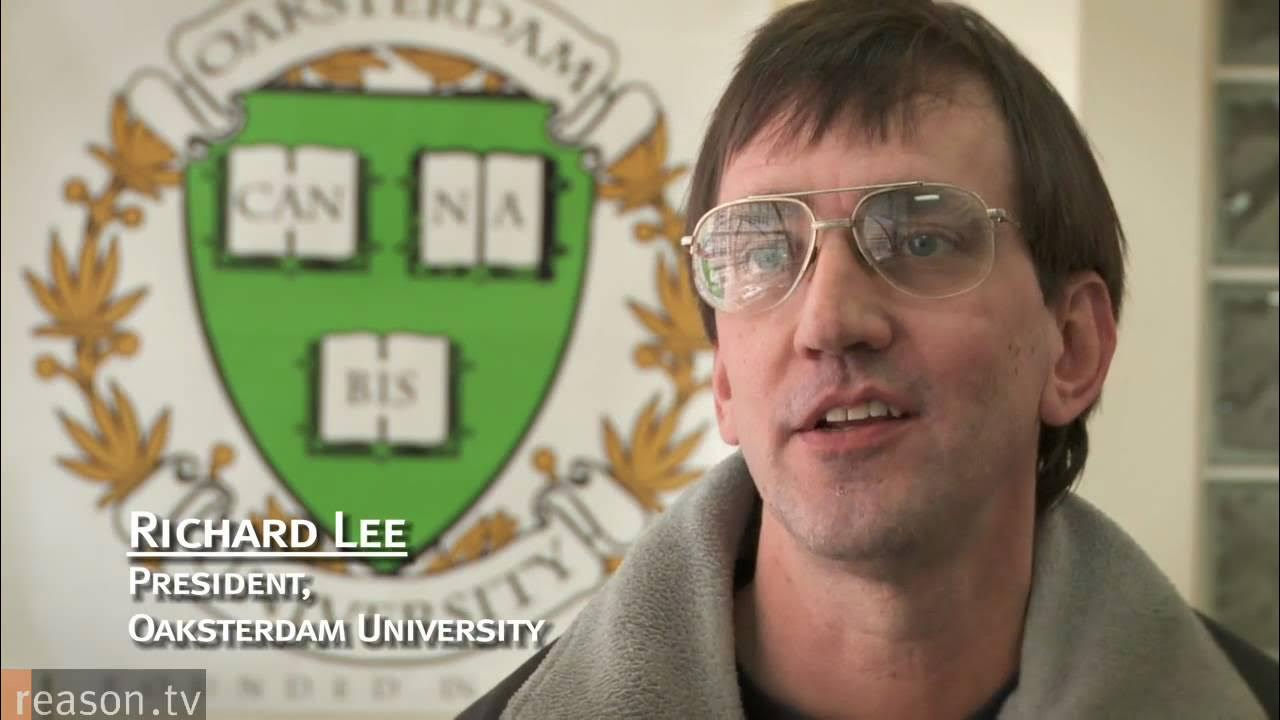
The landscape of cannabis in America, once shrouded in prohibition and stigma, has undergone a profound transformation over the past few decades. Much of this shift, which has seen cannabis become legally regulated for either medical purposes or adult use in 40 states, can be attributed to the tireless dedication and entrepreneurial vision of individuals who dared to challenge the status quo. Among these pioneers, Richard Lee stands as a monumental figure, whose life’s mission, born from personal adversity, paved an undeniable path toward widespread cannabis legalization.
Lee, who passed away on July 27 in Houston at the age of 62 due to complications of cancer, was more than just an activist; he was, as NPR once dubbed him, “the Johnny Appleseed of pot.” His journey from relying on marijuana for pain relief after a paralyzing accident to founding the groundbreaking Oaksterdam University and spearheading pivotal legalization efforts exemplifies a rare blend of courage, business acumen, and unwavering commitment to justice. He formalized cannabis education and relentlessly pushed for policy reform, believing deeply that the “war on drugs was a war on all of us.”
This in-depth look explores the foundational chapters of Richard Lee’s remarkable life, delving into the personal experiences that ignited his passion, the establishment of his influential businesses, and the creation of institutions that reshaped public perception and laid the groundwork for a new industry. His story is one of an individual who did not wait for the system to catch up but instead worked relentlessly to make it right, demonstrating that dedication and vision could indeed lead to a domino effect of global change.

1. **A Personal Catalyst: The Accident and Discovery of Cannabis**Richard Lee’s life took a dramatic and unforeseen turn in 1990 when he was just 28 years old. While working as a roadie, setting up lights for an Aerosmith concert rehearsal in New Jersey, he suffered a catastrophic fall from a scaffold. This accident had life-altering consequences, as it shattered multiple vertebrae, leaving him permanently in a wheelchair.
In the aftermath of this devastating injury, Lee grappled with immense physical challenges, including severe back spasms and chronic nerve pain. It was during this period of intense suffering that he discovered cannabis. What began as a means to alleviate his pain quickly transformed into something far more profound; cannabis became his salvation, and subsequently, his life’s mission. His personal experience with the plant’s therapeutic benefits ignited a fierce conviction that would shape the rest of his journey.

2. **The Genesis of an Advocate: Early Ventures in Cannabis and Shifting Minds**Lee’s burgeoning advocacy for cannabis began to take tangible form in the early 1990s. In 1992, he co-founded Legal Marijuana—The Hemp Store in Houston, Texas, marking it as one of the very first hemp product retail outlets in the United States. This initial venture into the cannabis space was a testament to his entrepreneurial spirit and an early indicator of his commitment to legitimizing the plant.
Beyond business, Lee embarked on a deeply personal mission to challenge ingrained societal perceptions about cannabis. Remarkably, he succeeded in converting his own conservative Christian parents, who were Goldwater Republicans, to cannabis advocacy. This achievement underscores his ability to shift hearts and minds, a quality that would become a hallmark of his lifelong commitment to reform.
His advocacy soon led him to a pivotal connection with Jeff Jones, a co-founder of the Oakland Cannabis Buyers’ Cooperative (OCBC). By the mid-1990s, despite Texas’s severe marijuana laws, Lee was growing cannabis in his home state and shipping it to Oakland, where Jeff Jones would distribute it through the OCBC to medical patients. This collaboration eventually prompted Lee to move to Oakland in 1997, seeking safer and more legal access to cannabis and deepening his involvement in the burgeoning medical cannabis movement in California.

3. **Forging a Cannabis Hub: The Birth of Oaksterdam’s Businesses**Upon relocating to Oakland, Richard Lee, in close collaboration with Jeff Jones, began a transformative project: reshaping downtown Oakland into what became affectionately known as “Oaksterdam.” This vibrant district was envisioned as a safe and regulated hub for the cannabis industry, modeled after the progressive cannabis culture of Amsterdam. Their efforts were instrumental in creating a recognized “safe cannabis district” that attracted global attention from those interested in cannabis legalization.
Lee’s entrepreneurial drive led to the establishment of several iconic businesses that would define the Oaksterdam experience. In 1999, he opened the Bulldog Coffeeshop, an Amsterdam-style dispensary that served as both a cannabis outlet and a social space. This was followed by the opening of Coffeeshop Blue Sky in 2003, further cementing his presence in the city’s burgeoning cannabis scene. These establishments were more than mere businesses; they were living examples of how a regulated cannabis industry could operate openly and professionally.
Beyond these well-known dispensaries, Lee’s micro-empire of pot in Oakland expanded to include a gift shop with a cannabis cultivation operation in the back and even a pot-themed museum. These varied ventures contributed significantly to Oakland’s revitalization and economic growth, drawing tourists and creating jobs while also generating the funds that would ultimately fuel his larger political ambitions for legalization.

4. **Local Impact and Political Foundations: Oakland’s Measure Z and The Oaksterdam News**Richard Lee understood that true change required not just business innovation but also strategic political action. In 2003, he founded the Oakland Civil Liberties Alliance (OCLA), a Political Action Committee (PAC) instrumental in the passage of Oakland’s Measure Z. This landmark ballot measure was a significant local victory, demonstrating how community-led efforts could influence policy at the municipal level.
Measure Z played a crucial role in advancing cannabis reform within Oakland by making private sales, cultivation, and possession of cannabis the lowest law enforcement priority. Crucially, it also mandated that Oakland tax and regulate cannabis as soon as state law allowed, laying essential groundwork for future city taxation and regulation. The measure’s passage led to a significant 89% reduction in cannabis possession arrests the following year, highlighting its immediate positive impact on the community.
Between 2005 and 2007, Lee further solidified Oakland’s position as a hub for the cannabis reform movement by publishing The Oaksterdam News. This quarterly newspaper boasted an impressive circulation of over 100,000, serving as a vital medium to disseminate information about cannabis policy, tout the economic benefits of legalization, and galvanize public support. Through these initiatives, Lee seamlessly blended enterprise with advocacy, building a robust foundation for the broader legalization efforts that would soon follow.

5. **A Vision Realized: The Founding of Oaksterdam University**In 2007, Richard Lee brought another of his revolutionary visions to fruition with the founding of Oaksterdam University, the first cannabis college in the United States, and indeed, the world’s first cannabis training school. This institution was a game-changer, professionalizing an industry that had long been relegated to the shadows and treated with disdain. Lee’s core belief was to formalize cannabis education and, in doing so, destigmatize the plant.
Oaksterdam University offered coursework designed to prepare students for various careers within the burgeoning cannabis industry, catering to everyone from prospective start-up founders to “budtenders,” the term for dispensary workers. For aspiring cultivators, a $999 certification program in commercial horticulture management covered essential topics like plant genetics, soil science, pest control, and light manipulation for optimal flowering. Those looking to manage cannabis companies could enroll in a $599 course on cannabis law, insurance liabilities, and intellectual property protections.
Lee’s approach was to make cannabis education accessible, professional, and transparent, even inviting media, regulators, and policymakers to the campus. The university quickly gained prominence, attracting over 100,000 students from 116 countries who passed through its programs. A former student from 2010 aptly recalled, “Back then, the idea of ‘cannabis college’ felt like something out of a Cheech and Chong fever dream. But there we were, getting real education, talking tax code, terpene profiles and the Constitution.” This sentiment perfectly captures Lee’s success in transforming a fringe concept into a legitimate academic pursuit.

6. **The Philosophy of a Pioneer: Beyond Profit and Stereotypes**While Richard Lee was undoubtedly a successful entrepreneur, his colleagues consistently emphasized that his motivations extended far beyond mere profit. Dale Sky Jones, the executive chancellor of Oaksterdam University, articulated this clearly, stating, “Richard firmly believed this war on drugs was a war on all of us.” This deep-seated conviction fueled his relentless drive for reform, viewing cannabis prohibition as a fundamental assault on individual liberties and societal well-being.
Lee frequently argued that outlawing cannabis only allowed a criminal underground to flourish, drawing a powerful historical parallel: “I mean, come on,” he once said to The New Yorker, “Didn’t Prohibition help Al Capone?” He contended that marijuana prohibition distracted law enforcement from more serious violent crimes, citing a carjacking he himself suffered in Houston as an example of misplaced priorities. His arguments consistently underscored the economic benefits and public safety improvements that would accompany legalization, a pragmatic approach that resonated widely.
Furthermore, Lee was resolute in his efforts to reshape the public perception of cannabis users, pushing back against the stereotypical image of the indolent “stoner.” He instilled this ethos in his students at Oaksterdam University, famously telling The New Yorker, “We tell our students that you want to avoid the idea of being a typical stoner who just gets high and throws the Frisbee.” He often remarked on his balanced philosophy, advising that “You’ve got to be a hard, cold Republican in business,” but also noting that “sometimes, even in business, it’s good to just mellow out.” This blend of astute business acumen and a relaxed, principled stance defined his unique approach to activism and entrepreneurship.”




